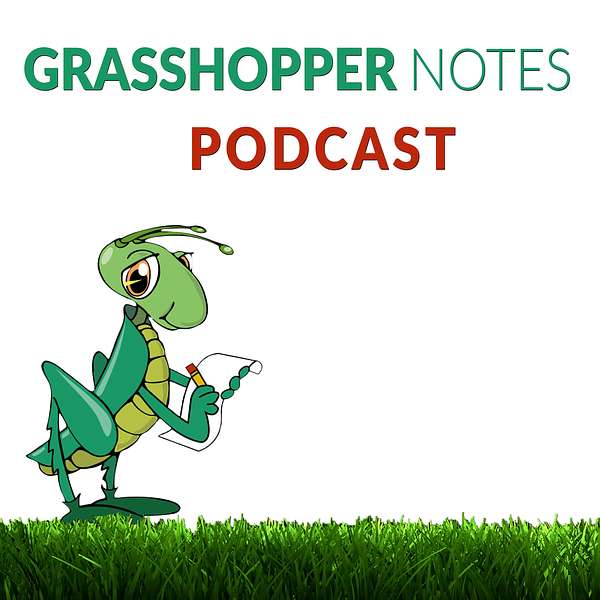
Grasshopper Notes Podcast
The Grasshopper Notes Podcast is hosted by John Morgan the man who has been billed as America’s Best Known Hypnotherapist.
John’s podcasts are a collection of guided meditations and bite-sized, mini podcasts which open you to new ways of thinking, communicating, and responding. You get a finer appreciation of how your mind works and how to use your internal resources to your best advantage.
See a video of John's background at the following link: https://www.youtube.com/watch?v=XbCPd00ok0I
In short, John Morgan is a people helper. Explore this channel and see what he can help you discover.
Grasshopper Notes Podcast
Guilty Pleasure
Use Left/Right to seek, Home/End to jump to start or end. Hold shift to jump forward or backward.
How useful is guilt? Find out in this mini podcast from John Morgan.
Grasshopper Notes are the writings from America's Best Known Hypnotherapist John Morgan. His podcasts contain his most responded to essays and blog posts from the past two decades.
Find the written versions of these podcasts on John's podcasting site: https://www.buzzsprout.com/1628038
"The Grasshopper" is the part of you that whispers pearls of wisdom that seem to pop into your mind from out of the blue. John's essays and blog posts are his interpretations of these "Nips of Nectar." Others have labeled his writings as timeless wisdom.
Most of the John's writings revolve around self improvement and self help. They address topics like:
• Mindfulness
• Peace of mind
• Creativity
• How to stay in the present moment
• Spirituality
• Behavior improvement
And stories that transform you to a wider sense of awareness that presents more options. And isn't that what we all want, more options?
John uploads these podcasts on a regular basis. So check back often to hear these podcasts heard around the world. Who wants to be the next person to change?
Make sure to order a copy of John's new book: WISDOM OF THE GRASSHOPPER – 21 Days to Creativity. These mini-meditations take you inside where all your creative resources live. And you'll come out not only refreshed but recommitted to creating your future.
It's only $16.95 and available at BLURB.COM at the link below. https://www.blurb.com/b/10239673-wisd...
Also, download John's FREE book INTER RUPTION: The Magic Key To Lasting Change. It's available at John's website https://GrasshopperNotes.com
Guilty Pleasure
The phrase, “Never make the same mistake twice” is about as motivating as “I was sad because I had no shoes, until I met a man who had no feet.”
Everyone makes the same mistake thousands of times. They're the byproduct of unproductive habits that we all own. A more effective piece of advice would be to notice your mistake while you're making it. It doesn’t guarantee you won't make it again, but it increases the odds that you’ll update and outgrow the pattern.
Beating yourself up about your mistakes is the poorest strategy for outgrowing them. The “no feet” story is a guilt inducer. If guilt were a motivator of change, Catholic and Jewish girls would be the most guiltless people on the planet. What's never played out in the “no feet” comment is what happens five minutes later. The person with no shoes goes back to feeling sorry for themselves.
Regarding mistakes, acknowledge them, apologize for them, pay the associated penalty and then get on with the business of outgrowing them. It begins with recognition.
Outgrowing something is noticing there's something to outgrow. The effort that’s necessary is to train yourself to notice unproductive behavior while it’s happening. Reminds me of a story I told at my seminars . . .
Pretend a friend has asked you to watch their 6 year old after school and feed them dinner. When you arrive at her house, your friend instructs you that their child is not to have any cookies before dinner. So, you being the diligent caretaker, count the cookies in the cookie jar that's in the kitchen. There are nine cookies. The child comes home from school and you announce the “no cookies before dinner” policy. The kid nods and then goes off to another room and begins to play video games. You go about doing some of the things you brought with you to work on: balancing your checkbook, answering emails and some texts, and you do this while sitting at the dining room table. Now it’s dinner time and you fix a meal for you and the 6 year old. You notice that the kid just picks at the meal and hardly eats anything. They say, "I'm just not hungry." So, they scoot off back to the den and you begin to clean up the kitchen.
But something tells you to check the cookie jar. You notice that there are now only five. You immediately deduce that the kid didn’t have them after dinner because you’ve been cleaning up in that room since dinner ended and would have seen that happen. It dawns on you that while you were working in the dining room, they snuck into the kitchen and took the cookies. Now let me ask you, "How effective would it be to go into the game room and berate them for eating the cookies?" Not very. The behavior is over with. But, what would've happened if, out of the corner of your eye, you spotted them pilfering cookies before dinner and shouted out, “Hey”? You would have interrupted the behavior in midstream and had a much different outcome.
So, ask yourself this: How helpful is it to beat yourself up after eating a pint of Ben & Jerry’s“Pumpkin Cheesecake”?
The two words to ponder are Guilt and Recognition. Begin to compare the effectiveness of each in outgrowing undesirable habits. And I'm pretty sure you'll recognize the hands-down winner.
See, I would feel guilty if I didn’t get you to recognize which one works better.
All the best,
John
